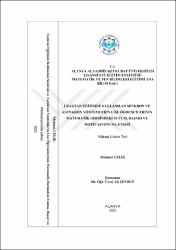Uzaktan eğitimde kullanılan senkron ve asenkron yöntemlerin lise öğrencilerinin matematik dersindeki tutum, başarı ve motivasyonuna etkisi
Abstract
Bu araştırmanın amacı, asenkron (eş zamanlı olmayan) ve senkron (eş zamanlı) yöntemle eğitim uygulanan lise öğrencilerinin matematik dersindeki tutum, başarı ve motivasyonları üzerine olan etkilerini belirlemektir. Araştırmada zayıf deneysel desen çeşitlerinden statik grup öntest-sontest araştırma deseni kullanılmıştır. Araştırmada rastlantısal olmayan önceden belirlenmiş asenkron ve senkron yöntemle eğitim uygulanan gruplardan elde edilen veriler kullanılmıştır. Senkron ve asenkron eğitimin uygulandığı gruplardaki öğrencilere farklı uzaktan eğitim yöntemleri uygulanmış ve test sonuçları karşılaştırılmıştır. Araştırmadaki senkron yöntemle eğitim uygulanan ve asenkron yöntemle eğitim uygulanan gruplarda 15'er öğrenci ile çalışılmıştır. Verilerin toplanmasında anket formu kullanılmıştır. Anket formunda Matematik Motivasyon Ölçeği, Matematik Tutum Ölçeği ve Başarı Testi bulunmaktadır. Veri analizleri SPSS 21 paket programı kullanılarak yapılmıştır. Araştırma sonucunda senkron yöntemle eğitim uygulanan matematik dersinde öğrencilerin derse yönelik motivasyonlarının ve başarılarının yükseldiği belirlenmiştir. Bununla beraber asenkron yöntemle eğitim uygulanan matematik dersinde öğrencilerin derse yönelik tutum seviyelerinin yükseldiği gözlemlenmiştir. The aim of this study is to determine the effects of asynchronous and synchronousdistance education on high school students' attitudes, success and motivation in mathematics lessons. In the research, quasi-experimental research design was used. The data obtained from the non-random predetermined experimental and control groups were used in the study. Different teaching methods were used for the experimental and control groups and the test results were compared. In the research, 15 students were studied for each of the experimental and control groups. A questionnaire form was used to collect data. The questionnaire form includes Mathematics Motivation Scale, Mathematics Attitude Scale and Achievement Test. Data analysis was done in SPSS 21 package program. As a result of the research, it was determined that the motivation and success of the students increased in the mathematics courseheld with synchronous distance education methods. In addition, students' perceptions of attitudes to wards the lesson increase in mathematics lessons with asynchronous distance education methods.
Collections
- Tez Koleksiyonu [242]


















